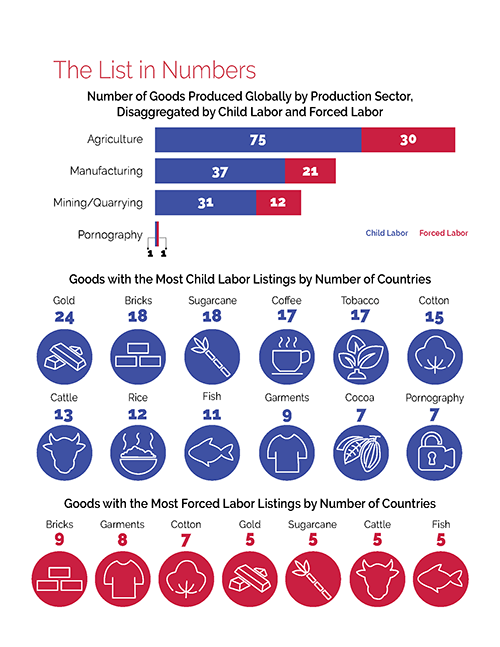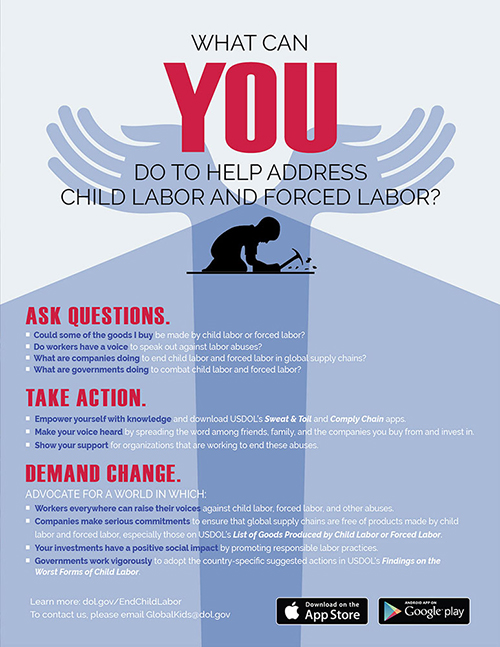List of Goods Produced by Child Labor or Forced Labor
The Bureau of International Labor Affairs (ILAB) maintains a list of goods and their source countries which it has reason to believe are produced by child labor or forced labor in violation of international standards, as required under the Trafficking Victims Protection Reauthorization Act (TVPRA) of 2005 and subsequent reauthorizations. The List of Goods Produced by Child Labor or Forced Labor comprises 159 goods from 78 countries and areas, as of September 28, 2022.
ILAB maintains the List primarily to raise public awareness about forced labor and child labor around the world and to promote efforts to combat them; it is not intended to be punitive, but rather to serve as a catalyst for more strategic and focused coordination and collaboration among those working to address these problems.
Publication of the List has resulted in new opportunities for ILAB to engage with foreign governments to combat forced labor and child labor. It is also a valuable resource for researchers, advocacy organizations and companies wishing to carry out risk assessments and engage in due diligence on labor rights in their supply chains.
The countries on the List span every region of the world. The most common agricultural goods listed are sugarcane, cotton, coffee, tobacco, cattle, rice, and fish. In the manufacturing sector, bricks, garments, textiles, footwear, carpets, and fireworks appear most frequently. In mined or quarried goods, gold, coal and diamonds are most common.
ILAB published the initial TVPRA List in 2009 and updated it annually through 2014, following a set of procedural guidelines that were the product of an intensive public consultation process. ILAB now updates and publishes the List every other year, pursuant to changes in the law.
Procedural Guidelines
On January 25, 2024, ILAB's Office of Child Labor, Forced Labor, and Human Trafficking published Procedural Guidelines for the development and maintenance of the List of Goods from countries produced by child labor or forced labor in violation of international standards.
| Country/Area Sort descending | Good | Exploitation Type |
|---|---|---|
| Bangladesh | Child Labor | |
| Bangladesh | Child Labor | |
| Bangladesh | Child Labor | |
| Belize | Child Labor | |
| Belize | Child Labor | |
| Belize | Child Labor | |
| Benin | There are reports that children ages 6-17 are forced to produce cotton in Benin. Cotton is grown primarily in the north, such as in Banikoara, and according to NGOs and international organizations, many of the children are trafficked or migrate to this area from other parts of the country, or from Burkina Faso or Togo. Some children are lured by traffickers with false promises about working conditions or terms. Some children work on year-long contracts and are not allowed to leave until the end of the year. They are paid only at the end of the contract, once the cotton is sold, but most children report that they do not receive their full payment, and some are not paid at all. Children usually live with their employer, and do not receive sufficient food. |
Child Labor, Forced Labor |
| Benin | Child Labor | |
| Bolivia | Child Labor, Forced Labor | |
| Bolivia | There are reports that children are forced to produce sugarcane in Bolivia. Based on the most recently available data from the ILO, it is estimated that almost a quarter of the migrants working in the sugarcane harvest are children under age 14, of which many are working in conditions of forced labor Many children work with their families under conditions of bonded labor. Entire families, including children, live in accommodations provided by the employer; this dependence on the employer increases their vulnerability to forced labor. The families receive little payment if any, and lodging and food expenses are deducted from their paychecks. Some children inherit the debt of their parents if their parents pass away or stop working, and remain bonded and able to be sold to a different employer. |
Child Labor, Forced Labor |
your hand? Download ILAB's Sweat & Toil App today!
Are you a company looking to fight child labor and forced labor in supply
chains?





